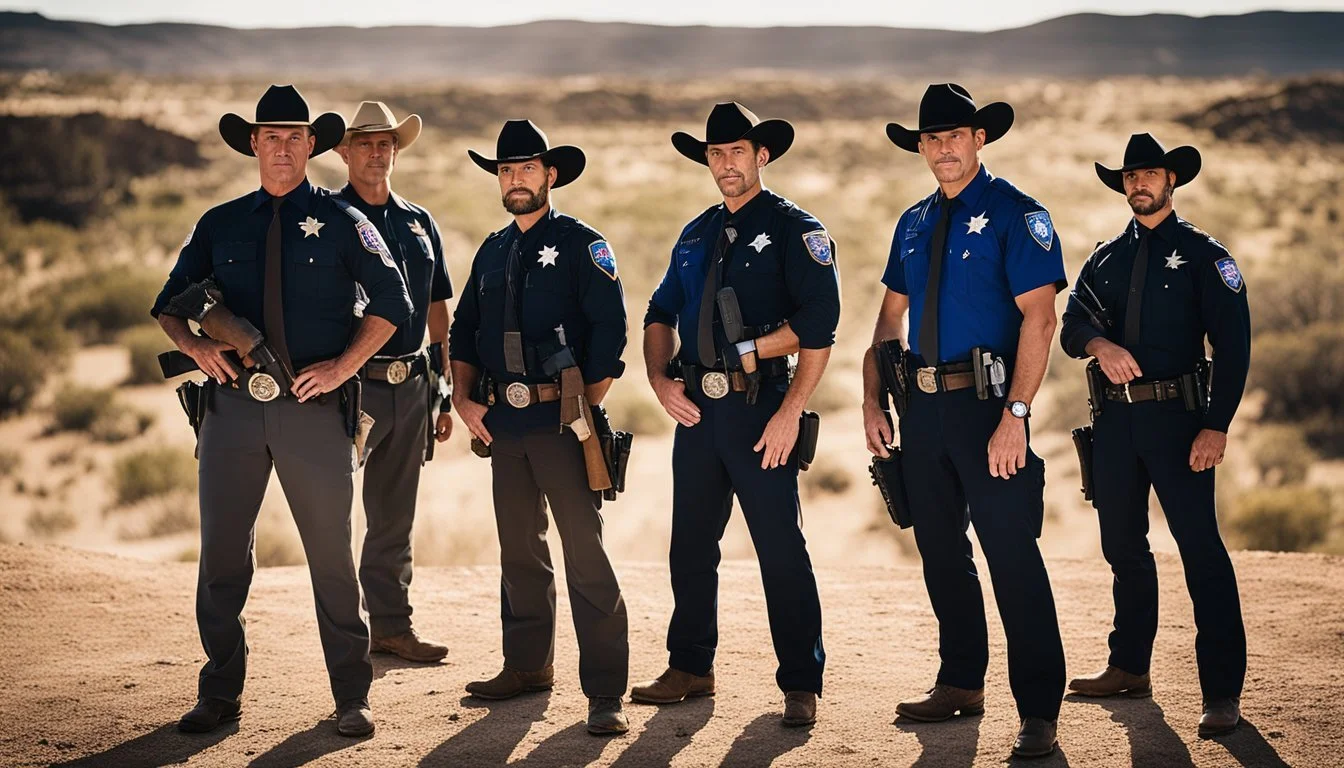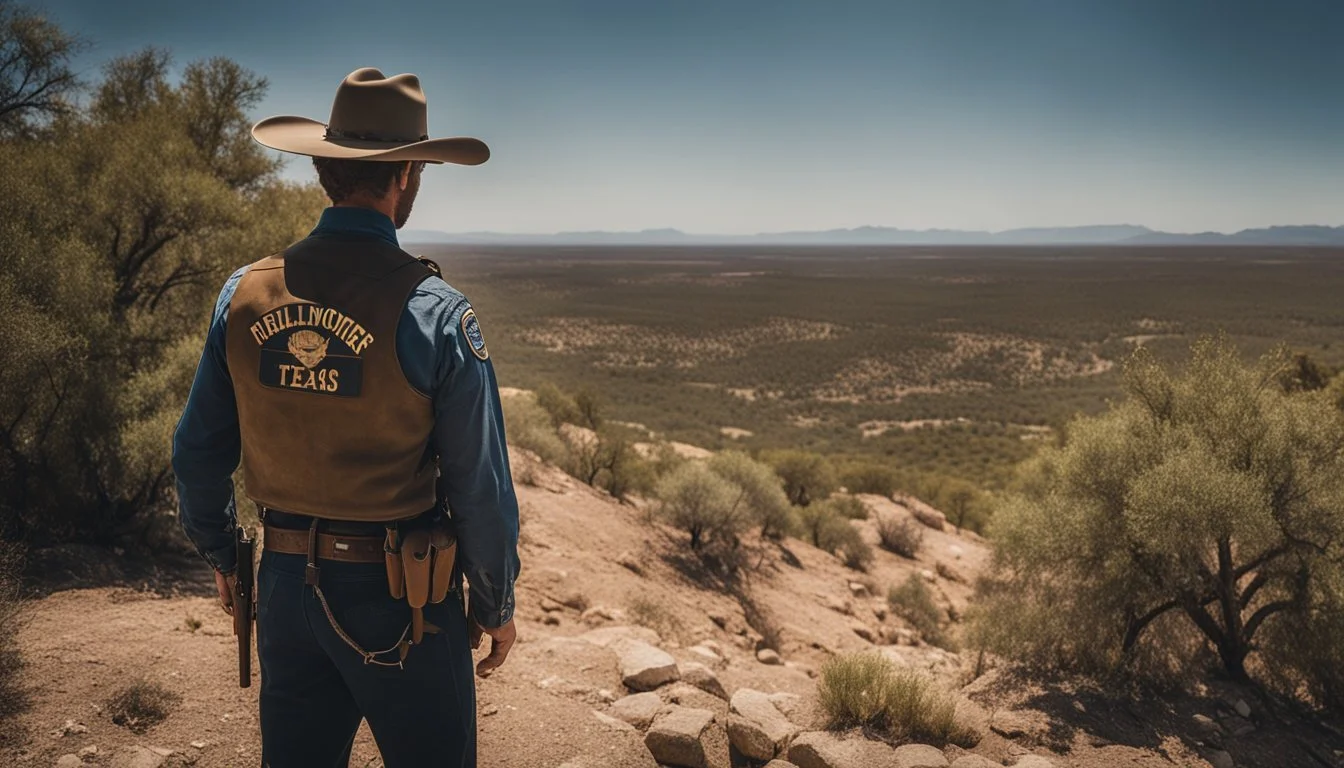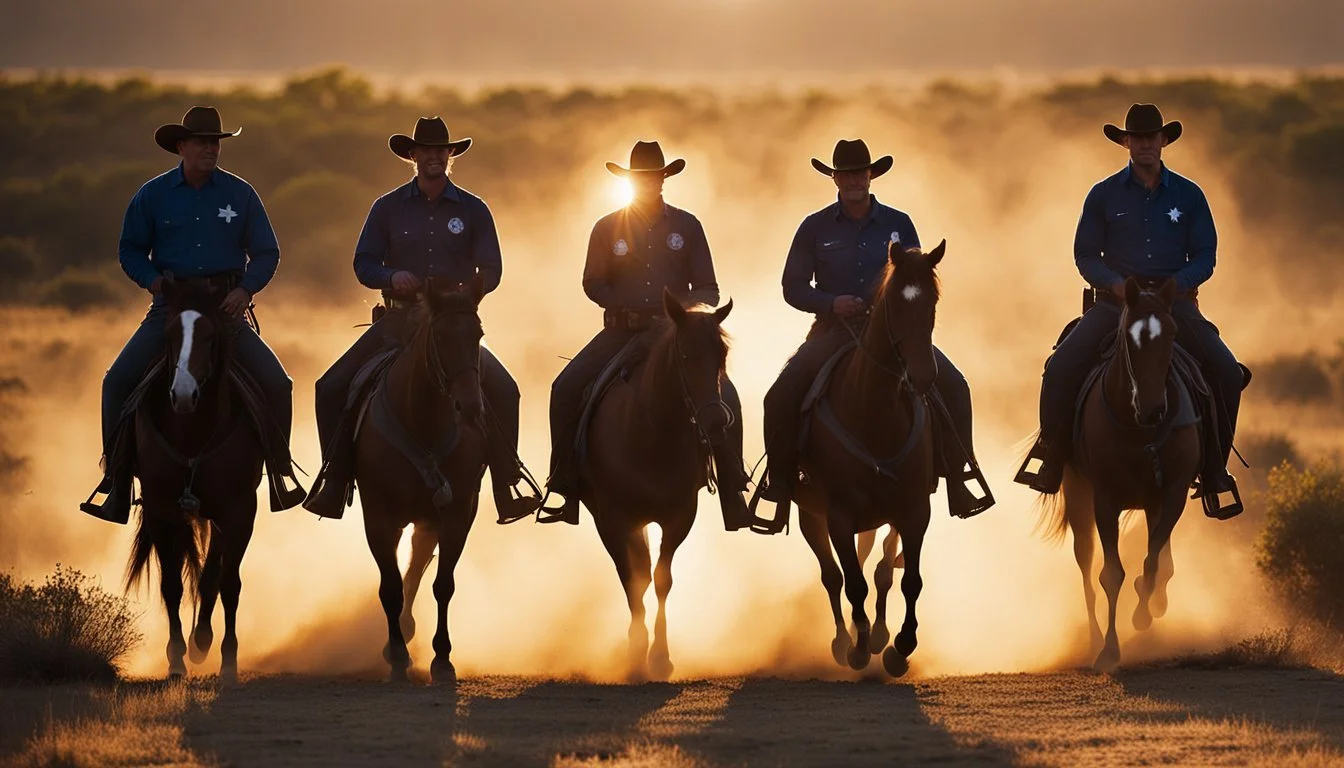6 Documentaries Showcasing Bill McDonald's Texas Rangers
Exploring the Legacy of Old West Law Enforcement
Bill McDonald was a legendary Texas Ranger who served in the late 19th and early 20th centuries. His career spanned a period of significant change in law enforcement on the Texas frontier. McDonald's exploits and leadership as a Ranger captain made him one of the most prominent figures in the organization's history.
Several documentaries have been produced showcasing Bill McDonald and the Texas Rangers during his era. These films provide insights into McDonald's life, his techniques for maintaining order, and the challenges faced by Rangers as Texas transitioned from a wild frontier to a more settled state. The documentaries combine historical records, expert commentary, and dramatic reenactments to bring this fascinating period of Texas history to life.
1) 'They Call Me Ranger McDonald' by John H. Jenkins (1978)
'They Call Me Ranger McDonald' is a documentary that delves into the life and career of Captain Bill McDonald, one of the most renowned Texas Rangers. The film showcases McDonald's contributions to law enforcement in the late 19th and early 20th centuries.
Director John H. Jenkins presents a balanced portrayal of McDonald's exploits, including his efforts to maintain order in the Texas frontier. The documentary features interviews with historians and descendants of McDonald, providing insight into his character and legacy.
Viewers learn about McDonald's role in notable incidents, such as the Wichita Falls bank robbery and the Brownsville Affair. The film also explores his reputation as a tough but fair lawman, earning him the nickname "One Riot, One Ranger."
'They Call Me Ranger McDonald' offers a glimpse into the changing landscape of Texas law enforcement during McDonald's tenure. It highlights his adaptation to new technologies and investigative techniques as the state transitioned into the modern era.
Learn more about Captain Bill McDonald
2) 'Rangers of the Lone Star' by Zane Grey
'Rangers of the Lone Star' is a classic Western novel by Zane Grey, originally published in 1915. The story follows a U.S. deputy marshal on special assignment from the Texas Rangers.
The protagonist must confront rampant cattle rustling and a hostile town mayor in a small Texas community. Grey's vivid descriptions of the rugged landscape and frontier life paint a captivating picture of the Old West.
The novel showcases the challenges faced by Texas Rangers in maintaining law and order during a tumultuous period. It highlights their dedication to justice and the complexities of frontier law enforcement.
'Rangers of the Lone Star' demonstrates Grey's mastery of the Western genre. His attention to historical detail and authentic portrayal of ranger life contribute to the novel's enduring appeal.
While not a documentary, this work of fiction provides insight into the romanticized perception of Texas Rangers in popular culture. It has influenced subsequent depictions of rangers in literature and film.
More information about Zane Grey
3) 'The Texas Rangers: Wearing the Cinco Peso, 1821-1900' by Mike Cox
Mike Cox's book provides a comprehensive look at the early years of the Texas Rangers. It covers the period from 1821 to 1900, detailing the organization's origins and development.
The Rangers began in 1821 with just a few men. Their initial purpose was protecting settlers from Karankawa Indians. As more people moved to Texas, the Rangers' role expanded.
Cox explores how the Rangers evolved to face various challenges. These included conflicts with Native Americans, Mexican forces, and outlaws. The book highlights key figures and events that shaped the Rangers' history.
The title refers to the "cinco peso," a silver star badge worn by Rangers. This symbol became iconic of their authority and reputation. Cox's work offers insights into how the Rangers' legend grew over time.
The book draws on extensive research to present a factual account. It avoids romanticizing the Rangers while acknowledging their significant impact on Texas history.
More information about Mike Cox's book
4) 'Gunpowder Justice: A Reassessment of the Texas Rangers' by Rick Miller
This documentary examines the complex history of the Texas Rangers. It explores their role in maintaining order on the frontier and their interactions with various communities.
The film delves into the Rangers' origins in the 1820s and their evolution over time. It highlights both heroic acts and controversial incidents involving the organization.
Interviews with historians and descendants of Rangers provide multiple perspectives. The documentary also features archival footage and photographs to illustrate key events.
Miller's work addresses criticisms of the Rangers, including allegations of racism and excessive force. It considers how changing social attitudes have impacted perceptions of the Rangers' legacy.
The film discusses famous Rangers like Bill McDonald and their impact on Texas history. It examines how the Rangers adapted to new challenges as Texas transformed from a frontier territory to a modern state.
More information on the Texas Rangers
5) 'One Ranger: A Memoir' by H. Joaquin Jackson (2005)
H. Joaquin Jackson's memoir provides a captivating glimpse into the life of a modern Texas Ranger. Jackson served from 1966 to 1993, patrolling a vast area along the Texas-Mexico border.
The book recounts Jackson's experiences in law enforcement, including his involvement in ending a prison revolt at Carrizo Springs jail. It also details his pursuit of "The See More Kid," an elusive horse thief and burglar.
Jackson's career took him from intense shootouts to unexpected places like Hollywood film sets. His iconic image even graced the cover of Texas Monthly, solidifying his status as a symbol of the contemporary Texas Rangers.
The memoir offers readers a firsthand account of maintaining law and order in the Lone Star State. It explores the challenges and triumphs of being a Texas Ranger in the late 20th century.
Jackson's story embodies the legendary "one riot, one Ranger" ethos, demonstrating how a single officer could make a significant impact in upholding justice and peace.
More information about H. Joaquin Jackson
6) 'The Ranger Ideal Volume 1: Texas Rangers in the Hall of Fame, 1823-1861' by Darren L. Ivey (2017)
'The Ranger Ideal Volume 1' is a comprehensive book that delves into the lives of seven Texas Rangers inducted into the Hall of Fame. These Rangers served before the Civil War, between 1823 and 1861.
The book offers detailed biographies of notable figures like Stephen F. Austin, Jack Hays, and Rip Ford. It provides insight into their contributions to Texas history and the development of the Ranger force.
Ivey's work is meticulously researched, drawing from a wide range of historical sources. The author presents a balanced view of these early Rangers, highlighting their achievements while acknowledging the complexities of their era.
This volume is part of a planned three-book series covering all Texas Rangers in the Hall of Fame. It serves as a valuable resource for those interested in early Texas history and the origins of the Texas Rangers.
Historical Overview of the Texas Rangers
The Texas Rangers emerged as a frontier law enforcement agency, evolving from irregular militia to an elite police force. Their history spans nearly two centuries of Texas's development, marked by controversies and heroic exploits.
Origins and Formation
The Texas Rangers originated in 1823 when Stephen F. Austin hired ten men to protect settlers in Mexican Texas. These early Rangers patrolled on horseback, combating Native American raids and Mexican bandits. In 1835, the Texas Rangers became officially organized under the Republic of Texas.
The force expanded during conflicts with Mexico and Native American tribes. Rangers adopted distinctive techniques, including the use of revolvers and mounted combat. They gained a reputation for toughness and adaptability in harsh frontier conditions.
By the 1870s, the Rangers had become a more structured organization. The state legislature formalized their role, establishing companies and appointing captains. This period saw the rise of legendary figures like Leander McNelly and John B. Jones.
Role During the Civil War
The Civil War era brought significant changes to the Texas Rangers. Many Rangers joined Confederate forces, leaving Texas vulnerable to frontier threats. The state formed new Ranger units to maintain order and protect settlements.
These wartime Rangers focused on border security and internal policing. They confronted Union forces along the Rio Grande and suppressed deserters and outlaws within Texas. The Rangers also continued their traditional role of defending against Native American raids.
After the war, Reconstruction policies temporarily disbanded the Rangers. However, by 1874, the force was reestablished to combat lawlessness in the unsettled regions of Texas. This revival marked the beginning of a new chapter in Ranger history.
Bill McDonald's Contribution
Captain Bill McDonald played a pivotal role in shaping the Texas Rangers during a transformative period. His leadership and involvement in high-profile cases left an indelible mark on the organization.
Leadership and Legacy
Bill McDonald served as captain of Company B of the Frontier Battalion from 1891 onwards. His tenure coincided with the transition from the 19th to the 20th century, a time of significant change for the Rangers.
McDonald earned the nickname "Captain Bill" and became known as one of the "Four Great Captains" in Texas Ranger history. His leadership style emphasized individual initiative and adaptability.
He pioneered modern law enforcement techniques, moving the Rangers away from their frontier roots toward a more professional police force. McDonald's influence extended beyond his active service, shaping Ranger practices for years to come.
Prominent Cases and Operations
Captain McDonald tackled numerous high-profile cases during his career. In 1897, he led operations against the Buzzard's Water Hole Gang in San Saba County. This criminal group had been terrorizing the area, and McDonald's efforts were crucial in breaking up their activities.
He gained fame for his solo assignments, often handling situations that typically required multiple officers. This reputation likely contributed to the legendary "One Riot, One Ranger" quote associated with him, though its authenticity is debated.
McDonald's Rangers were involved in various peacekeeping missions, from quelling labor disputes to maintaining order in border towns. These operations showcased the evolving role of the Texas Rangers under his leadership.





